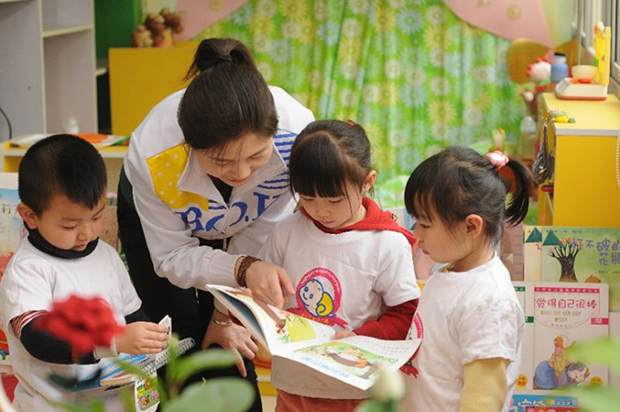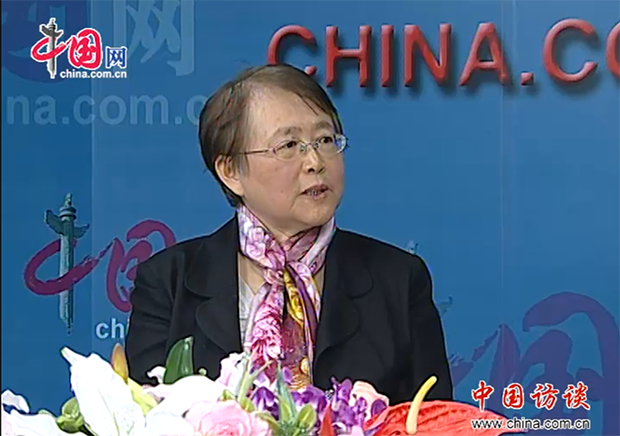Act for autism: A long way to go
- By Cui Can
 0 Comment(s)
0 Comment(s) Print
Print E-mail China.org.cn, December 30, 2017
E-mail China.org.cn, December 30, 2017
Autism, or more specifically "autism spectrum disorder" (ASD), is the broader name for a group of mental disorders that affect approximately 1 percent of China's population of roughly 1.3 billion. According to clinical researchers, this comes down to about 10 million people, and the rate of occurrence appears to be increasing every year.
"To act for autism, there is still a long way for us to go. Compared to the U.S. and European countries, professional study and rehabilitation in China just started out in the recent five years," said Xu Xiaoming, general secretary of the China Association of Rehabilitation of Disabled Persons, who has dedicated her life to providing professional care and special education for children with autism spectrum disorder (ASD).

Facing the lack of specification and professional talents in the industry of autism rehabilitation, Xu and her group are drawing up the guideline to instruct autism care institutions to offer professional intervention program and care service for ASD rehabilitation. She said she expects to finish drafting the guideline by the end of this year.
China.org.cn spoke with Xu about the obstacles in the development of ASD rehabilitation, the importance of a guideline, the shortage of autism support teachers, and why an inclusive education needs a more inclusive society. The interview has been translated from Chinese and edited for brevity and clarity.

China.org.cn: What is autism spectrum disorder (ASD)? How many children or adults in China are identified with ASD?
Xu Xiaoming: When it comes to the term "ASD," it usually refers to a range of conditions beginning in childhood that are characterized by challenges with social skills, repetitive behaviors, speech and nonverbal communication, as well as by the unique strengths in and differences between the people with the disorder.
For now, there is no official statistics about the rates of occurrence of ASD in children and adults in China. However, conservative estimates say that the autism rates may be one in 100, and it seems to be on an upward trend in recent years.
China.org.cn: Are there enough qualified care centers for these children with special needs? How do you see the development of autism rehabilitation in China?
Xu: Currently, there are around 1,000 rehabilitation institutions across China specializing in educating children with autism, and they receive financial support and professional guidance from the China Disabled Persons' Federation. However, there are also over 2,000 private institutions, the majority of which are run by people with no previous teaching experience, including some parents of children with autism. The institutions rely on tuition fees to survive and are usually under great financial pressure.
Some of these institutions are only doing the job for their parents -- simply offering basic care for these children with ASD, instead of designing an individual educational program based on ASD evaluation report and helping them develop the essential abilities to live independently. To address this, we need to put forward a general guideline for the development of the special care industry, in order to provide professional and efficient care services and training.
China.org.cn: Can you give us a brief introduction about this general guideline that you are working on?
Xu: This guideline will clearly define what ASD rehabilitation is as well as its mission. The care services for ASD should involve a series of detailed and scientific procedures -- from the professional evaluation of ASD to the formulation of an individual educational program, with the aim of supporting children with ASD to fit into society in the future.
The diagnosis of ASD should be regarded as the first and fundamental step. We encourage parents who fear that their children may have ASD to seek professional help right away, as early intervention can improve outcomes. However, many parents often have to wait a long time to get their autistic children enrolled by qualified treatment centers, meaning they miss the window for early intervention for the child.
Furthermore, the design of intervention educational programs should be tailored to the children's individual conditions and behavioral development, which is a crucial stage of caring for and training children with ASD. In behavioral applications to autism treatment, Board Certified Behavior Analyst (BCBA) and Board Certified Assistant Behavior Analyst (BCaBA) usually refer to the person who designs and manages the intervention program.
China.org.cn: How many BCBAs or BCaBAs are there in China? How do you see the shortage of workers in the industry of professional care for autistic children?
Xu: There are only 12 BCBAs and BCaBAs in all of China. There is a huge gap in the number of BCBAs and BCaBAs between China and Western countries, where the number could reach more than hundreds or thousands.
The shortage of professional behavior analysts and autism support teachers is hampering the whole industry. Last year, a three-year-old autistic boy died at an autism rehab center because the self-taught medical practitioner offered courses involving strict physical exercise and diet to help children "recover" from autism. This report has put the industry of autism rehabilitation under fire. Many parents and experts questioned and criticized the regulations on rehab centers for children with disabilities.
Facing the challenges in lacking autism support teachers with professional training, the China Disabled Persons' Federation organized qualified teachers to give courses to the staff in rehab centers, aiming to improve their awareness and expertise on treating ASD. However, the effort was very costly in terms of time, money and energy, and the results were not as good as we had expected.
China.org.cn: What are your thoughts on inclusive education? How do you see that some parents refuse to let their kids to study in the same school with special needs children?
Xu: Inclusive preschool education is the best way to help the kids develop the necessary abilities to live independently and enable them to better fit into society.
Based on my experience, it is easier for children with ASD who go through the inclusive preschool education programs to adapt to the school environment and society in the future than those who do not. Those programs are an efficient way for their rehabilitation.
For those parents who don't want their children to stay in the same class or school with children with autism, we must spend time reflecting on what had gone wrong in prior stages. Was there an evaluation on the child's behavioral development? Do we tell the parents that special needs children would not harm other children? What's more, what kind of inclusive education is suitable for children with ASD, all-day or half-day?
As we support inclusive preschool education, we need to clearly define the responsibilities and needs of teachers, parents, and -- most importantly -- the children. Every child has the right to have a fair and complete education.






Go to Forum >>0 Comment(s)